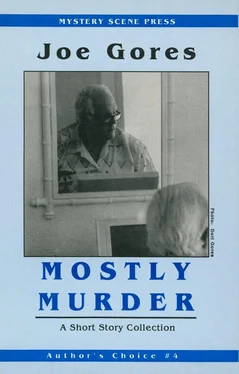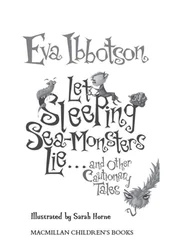Because I knew the instructor, in 1970 I was snuck into an Explosive and Sabotage Devices anti-terrorist course for police officers given at Ford Ord, California, by the Army’s 87th Ordnance Detachment. When not blowing stuff up, I talked with an FBI shrink who had developed a profile of the terrorist true believer: be he neo-Nazi militant, Communist zealot, student radical, or Middle East fanatic, he always feels that he, him alone, his actions, are going to alter the entire course of human history. Heady stuff. I wrote “Watch for It” to explore the inevitable human costs of such dangerously unreal expectations.
I got the idea for “The Andrech Samples” (then titled “Rogul for the Quota”) on a June 9th; the story was written that same day and went to market on the 22nd. Very fast for me; I don’t really like to write in the future tense — seldom do — so I write quickly, angrily, and the stories are dark, sardonic, touched with black humor, invariably grim. Bureaucracy is the true enemy, even for bureaucrats, and it can only get worse. With mankind’s finger on the self-destruct button, perhaps futuristic tales can only be written angrily.
I lived the year 1957 in Tahiti, getting up at four each day, writing non-stop until noon, then going skin-diving until dusk. Writing about death, because shortly before I left San Francisco I had been fired upon by an irate businessman and run down by an enraged cleric — in a single week. “Killer Man” was my reaction in story form. I had gotten the title months earlier on Upper Grant in North Beach when somebody with a beard and a guitar sang, “Killer man, don’t you kill kill me” in The Co-Existence Bagel Shop (it still existed then). I don’t know if this was a well-known song, or original with him; I never heard it again. But it gave me the perfect title for my hitman story.
My grandfather died during my junior year at Notre Dame. I hitched north through the snow to Minnesota to see him before he went, then wrote an angry little memoir called “Epitaph” — angry because I had loved him deeply and he was dead. Fifteen years later I was ready to make memoir into story: the angry man hitchhiking north was older, an escaped convict, the dying man was a father instead of a grandfather. Fred Dannay made me rewrite it, polish it, sandpaper its rough spots innumerable times — never letting me scour away the real emotion of the original. I called it “Goodbye, Pops,” EQMM published it, and Mystery Writers of America gave it that year’s Best Short Story Edgar.
So Mostly Murder is... mostly murder. No mainstream, no navel-gazing, no adventure tales, no hardcore science-fiction. Just criminous tales, mostly violent — with a soupçon of fantasy — and, I hope, an insight or two into the parts of human nature that give root to that violence. A pretty much representative selection of my mystery and suspense short stories that I still pretty much like. I hope you do too.
Joe Gores
San Francisco
May 1991
File #1:
The Mayfield Case
Larry Ballard was halfway to the Daniel Kearny Associates office before he remembered to switch on his radio. After a whine and a blast of static, O’Bannon’s voice came on loudly in mid-transmission.
“...Bay Bridge yet, Oakland 3?”
“Coming up to the toll plaza now. The subject is three cars ahead of me. I’ll need a front tail once he’s off the bridge, over.”
“Stand by. KDM 366 Control calling any San Francisco unit.”
Ballard unclipped his mike and pressed the red TRANSMIT button. “This is SF 6. My location is Oak and Buchanan, moving east, over.”
“Oakland 3 is trailing a red Comet convertible across Bay Bridge, license Charlie, X-Ray, Kenneth, 8-8-1. The legal owner, California Citizens Bank on Polk Street, wants car only — contract outlawed.”
Oakland 3 cut in: “Wait by the Ninth and Bryant off-ramp, SF 6.”
“Control standing by,” said O’Bannon. “KDM 366 clear.”
O’Bannon set down the hand mike on Giselle Marc’s desk, leaving it flipped to MONITOR. He was a wiry red-headed man about 40, with twinkling blue eyes, freckles, and a hard-bitten drinker’s face.
“Who’s SF 6? The new kid?”
“Right. Larry Ballard. With us a month yesterday.” Giselle was a tall lean blonde who had started with DKA as a part-time file girl while still in high school; after graduation from S.F. State two years before, she had taken over the Cal-Cit Bank desk. “He’s a green pea but he’s eager and maybe — just maybe — he can think. Kathy’s putting him on his own this week.”
O’Bannon grunted. “The Great White Father around?”
“Down in his cubbyhole — in a vile mood.”
O’Bannon grimaced and laid his expense-account itemization on her desk with great reverence. Giselle regarded it without enthusiasm.
“Why don’t you do your own dirty work, O’B?” she demanded.
Same day: 10:00 a.m.
Ballard was lanky, well-knit, in his early twenties, with blue eyes already hardened by his month with DKA. He was stopped, by Dan Kearny himself, at the top of the narrow stairs leading to the second floor of the old Victorian building that housed the company offices.
“That Comet in the barn?”
“Yes, sir,” said Ballard.
“Terrif. Any static?” Kearny was compact and powerful, with a square pugnacious face, massive jaw, and cold gray eyes which invariably regarded the world through a wisp of cigarette smoke.
“I front-tailed him from the freeway. When he parked on Howard Street, Oakland 3 and I just wired up the Comet and drove it away.”
Kearny clapped Ballard’s shoulder and went on. Ballard entered the front office, which overlooked Golden Gate Avenue through unwashed bay windows. Three assignments were in his basket on the desk of Jane Goldson, the phone receptionist with the Liverpool accent: through her were channeled all assignments, memos, and field reports.
Carrying the case sheets, Ballard descended to the garage under the building. Along the right wall were banks of lockers for personal property; along the left, small partitioned offices used by the seven San Francisco field men. He paused to review his new cases before leaving.
The most puzzling one involved a new Continental, financed through Cal-Cit Bank, which had been purchased by a Jocelyn Mayfield, age 23. She and her roommate, Victoria Goodrich, lived at 31 Edith Alley and were case workers for San Francisco Social Services. What startled Ballard was the size of the delinquent payments — $198.67 each — and the contract balance of over $7000. On a welfare worker’s salary? Even though her parents lived in the exclusive St. Francis Woods area, they were not cosigners on the contract.
From his small soundproofed office at the rear of the garage, Dan Kearny watched Ballard leave. Kearny had been in the game for over half of his 43 years, and still hadn’t figured out the qualities which made a good investigator; only time would tell if Ballard had them. Kearny jabbed an intercom button with a blunt finger.
“Giselle? Send O’Bannon down here, will you?”
He lit a Lucky, leaned back to blow smoke at the ceiling. O’B had come with him six years before, when Kearny had resigned from Waller’s Auto Detectives to start DKA with one car and this old Victorian building which had been a bawdy house in the ’90s; and reviewing O’B’s expense accounts still furnished Kearny with his chief catharsis.
He smeared out the cigarette; through the one-way glass he could see O’Bannon approaching the office, whistling, his hands in pockets, his blue eyes innocent of guile. When he came in, Kearny shook out a cigarette for himself and offered the pack. “How’s Bella, O’B?”
Читать дальше







![Джон Макдональд - The Hunted [Short Story]](/books/433679/dzhon-makdonald-the-hunted-short-story-thumb.webp)




